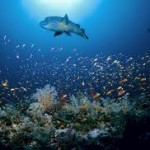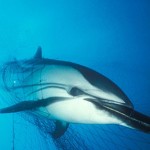 Did you know that 8 June is World Oceans Day? Like all days of designated observance, World Oceans Day was started to bring a yearly awareness, in this case to the state of our underwater world. Although water makes up ~70% of Earth’s surface, our seas remain one of the most unique, important, and yet unexplored parts of our world. As vast as our marine areas are, they are also extremely fragile, quickly being destroyed from an ever-increasing pressure by an ever-increasing human population. I suppose it is easy to dismiss what we do not see on a daily basis; out of sight, out of mind. However, as goes the ocean, goes the rest of the planet.
Did you know that 8 June is World Oceans Day? Like all days of designated observance, World Oceans Day was started to bring a yearly awareness, in this case to the state of our underwater world. Although water makes up ~70% of Earth’s surface, our seas remain one of the most unique, important, and yet unexplored parts of our world. As vast as our marine areas are, they are also extremely fragile, quickly being destroyed from an ever-increasing pressure by an ever-increasing human population. I suppose it is easy to dismiss what we do not see on a daily basis; out of sight, out of mind. However, as goes the ocean, goes the rest of the planet.
Since 2012, a number of positive changes have taken place to safeguard the ocean and the amazing creatures that call it home. The horrific act of shark finning robs the ocean of over 140 million sharks annually. Yes you read that correctly, more than 140 million sharks are killed so their fins can be used as a soup ingredient or false cure in a nonscience based medicine. From the smallest to the largest, no shark is safe. Taking a step in the right direction, the International Union for Conservation of Nature (IUCN) recently voted to add eight sharks to the threatened species list. Working with the Convention on International Trade of Endangered Species (CITES), the IUCN hopes their new listing will help conserve sharks. Keep in mind, this does not ban the trade of sharks and their fins, it simply increases the pressure to regulate the trade. Fortunately, individual countries have voted on legislature to ban the catching of sharks and use of their parts. Only with global support will sharks have a fighting chance.
On an international scale, a number of countries are taking responsibility for our oceans by designating protected areas within the marine environment that border their coastlines. Belize, island nations in the South Pacific, Cuba, and countries in the Caribbean all have marine parks to conserve and protect breeding areas for marine species both in and around the water. Currently, Australia has 3.1 million km2 within 59 marine parks protected. In addition, the United States has selected 400,000 km2 of “no-take areas” in over 223 marine preserves. However, as much progress has been done, more is required. Of all the 5, 880 protected areas around the world, marine parks only make up 1.17% of the worlds oceans.
Overfishing is a huge concern for the overall health of the oceans. The over harvest of large fish populations have forced commercial fishing vessels to fish deeper. Trawling is a fishing method in which nets are pulled behind boats. Net depths are set to skim the ocean bottom, which not only allows for capture of deep-sea species but also causes disruption to habitat like deep-water reefs. Overfishing at any depths puts an increase pressure on marine environments. To combat overfishing, Monterey Bay Aquarium is empowering the public with the choice to choose. Monterey Bay has developed a Seafood Buyer’s Guide, available on the web at http://www.montereybayaquarium.org/cr/seafoodwatch/web/sfw_regional.aspx and also as in app for smart phones and tablets. The Guide gives consumers information about purchasing seafood species, listing them in order of good, better, and best choices, as well as species not to purchase. Once the demand stops, the overharvest will too.
 As I type this, there is a floating island of garbage in the Pacific Ocean the size of the US state of Texas or 696, 241 km2. That is larger than all the protected marine areas within US waters. The island of rubbish is a great example of consumerism gone awry. Of the more than 280 million tons of plastic produced globally each year, less than 40% is recycled; leaving 60% to live out its long life buried in a land fill or finding a new home on the high seas. Plastic in all shapes and sizes pose huge threats to marine life as it can be deadly when ingested and entangle animals causing them to drown. By simply practicing the 3Rs, Reduce, Reuse, and Recycle, everyone can make a difference for ocean survival. Eliminating waste removes the environmental threat. It truly is as easy as 1, 2, 3.
As I type this, there is a floating island of garbage in the Pacific Ocean the size of the US state of Texas or 696, 241 km2. That is larger than all the protected marine areas within US waters. The island of rubbish is a great example of consumerism gone awry. Of the more than 280 million tons of plastic produced globally each year, less than 40% is recycled; leaving 60% to live out its long life buried in a land fill or finding a new home on the high seas. Plastic in all shapes and sizes pose huge threats to marine life as it can be deadly when ingested and entangle animals causing them to drown. By simply practicing the 3Rs, Reduce, Reuse, and Recycle, everyone can make a difference for ocean survival. Eliminating waste removes the environmental threat. It truly is as easy as 1, 2, 3.
The bottom line is that it is everyone’s responsibility to take care of our oceans and protect marine species. The choices we make today regarding what we consume will be the deciding factor of our planet fate. Huge strides have been taken to protect our beautiful ocean and the inhabitants within, but so much more needs to be done. So please join in on this World Oceans Day and pledge to be part of the solution and no longer the problem. Helping our seas help us too.
